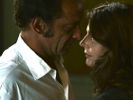Eye For Film >> Movies >> Bastards (2013) Film Review
Bastards
Reviewed by: Anne-Katrin Titze

The precision of Claire Denis' perplexities, the ardent blows that fire at the heart and the head, are unequaled in her film Bastards (Les Salauds). Leaden, crushing rain, pouring down on the world. A man fixes his tie in an unused kitchen, we see a letter, a snakeskin pump. He looks out at the rain. An ambulance. A naked woman in high heels is walking on the road in a close to catatonic state. Denis has conviction about the emotional workings of cinema.
Even without the ingrained, indelible image of the bloodstained ear of corn, William Faulkner's novel Sanctuary mirrors Bastards consummately in matter and method. The sound of rain at night can be most violent.

A man commits suicide. His wife Sandra (Julie Bataille) is given his letter at the police station. Our work begins. Who are these people? What happened? We find out by sticking close to Marco Silvestri, played by Vincent Lindon in an exquisitely steadfast performance, as a sea captain who leaves his job to help Sandra, his sister, and his niece Justine (Lola Créton). The almost wordless, bold performance by Créton, who was discovered by Catherine Breillat for Bluebeard, has also done terrific work in Mia Hansen Løve's Goodbye First Love and Something In The Air by Olivier Assayas, is the stripped core of Bastards, the stain besmirched.
Marco at sea, the light reflecting in his spectacles, casting the ship in the glass, his face in close-up. He is about to let go of his perfect man's life on the water.
The inscription on his watch says "My son who sails the sea." He is needed on land where the beasts roam. In Paris, one month later, he takes an apartment. In the same building lives Raphaëlle (Chiara Mastroianni, beautifully irresolute) who has a son with Edouard Laporte (Michel Subor, who here resembles Pope Benedict with eyeliner). Edouard was the wealthy business partner to Marco's now dead brother-in-law.
In a repeated constant, Raphaëlle picks up her son from school, a quotidian berth when everything else spins out of control. Denis' film is like those moments in life when you feel your grip slipping, and bigger pictures of corruption and deceit for an instant reveal their grinning face. As much as you would like to shift the culpability away, you are a part of it and the balm of blaming others is denied.
As it is to Marco's sister Sandra, who desperately wants to be seen as the victim, yet did nothing to protect her own teenage daughter from the businessmen, the bastards of the title, who rule the world with money and ever deepening shame.
People make decisions of destruction and flight. Claire Denis called her film Bastards "a shriek", during the conversation I had with her at the New York Film Festival.
Marco, the man from the water, first meets Raphaëlle in the elevator of their gloomy, bourgeois building. He fixes the son's broken yellow bicycle and he fixes the mother's craving for cigarettes when one night, after an unsuccessful run to the corner Tabac, Marco throws four packs of Lucky Strike wrapped in one of his fair white shirts down to her onto the street from his balcony. Denis sets up a perfect scene of seduction, in binding the risk of a gesture with calculated generosity and feint disdain. Raphaëlle wears unbecoming worsted bedroom slippers and only a coat on her errand, he throws her four packs, not one, and knows that she will bring back his shirt. How she returns it will give him a lot of information about her character, he thinks. And indeed it does.
Meanwhile, he visits his niece Justine in the hospital. "We may have to operate to repair her," the doctor says. The flashback images, like narrative lightning bolts, make us not forget that something was happening to Justine, with her Sadean name and the blood she sheds like Faulkner's Temple, and that is still running to this day in an endless barbaric flow.
Marco has to proceed with his detective work. His sister will have to declare bankruptcy. Morally she is already compromised. She keeps saying how ashamed she is. Edouard Laporte did not help out. The family's business is shoes. And there has been a change, since Marco left for the sea. The quality has become cheap, the shoes are tacky now. Denis shows them in color coordinated piles, suggestive of compulsive rapists or the result of an automated mass extinction of the women who fit them. "You've changed style," he says to his sister and means the shoes and her life.
Marco's further research into the abyss leads him to a pregnant prostitute wearing leopard print and a sleazy man at a barn in the countryside, where "private parties" were being held for businessmen. Stains on a frayed red pillow and the aforementioned ear of corn, with blood and hair, are all you want to know about these get togethers. No conversation is needed explaining the abhorrent particulars. "I'm not witty. I'm a very sinister person," Claire Denis commented at the NYFF about her preference for monologue over dialogue. "I hate victimisation of women," she said, "I don't want to give them only pity."
Edouard, a man much older than Raphaëlle, and his small son in riding gear drive off in the limousine. Marco falls for Raphaëlle as an unexpected consequence. At dusk, at the airport, a private plane is waiting for Edouard. His son, his last seed, will be trained by him. The businessman's power is far reaching, his cruelty designed. He watches and uses the guilt of women who have yet to take a stand.
Reviewed on: 22 Oct 2013















